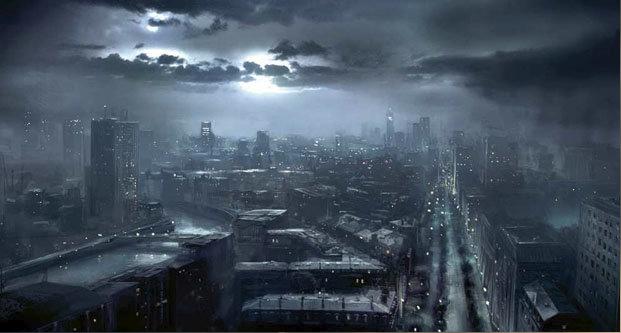
Strength Through Adaptation
The Iron Masters are adapters, survivors, and innovators. Constantly questioning themselves, they preserve that which deserves to stay and ruthlessly cull what no longer has a place. Traditions, ethoses, institutions, even people — if the Iron Masters say your time is up, no force on Earth can save you. They dwell among humans, because like it or not humans are leading the charge on innovation and adaptation. They aren’t the “modern tribe,” because that’s a false categorization. All the tribes live in the modern world, and they all employ its conveniences. What the Iron Masters do is adapt: They judge every change they see to know whether it is good or bad. They attach themselves to specific institutions or areas of their territories and either change them to be better or protect them from change, for long ago they swore an oath: Kul Kisura Udmeda. “Honor Your Territory in All Things.”
Ask the other tribes about the Farsil Luhal and they’ll say different things. They can’t leave their human lives behind, says the Hunter in Darkness who fed her own name to a spirit of forgetting. They trample things in the dust that were ancient and sacred before they were born, says the Bone Shadow who speaks in tongues long forgotten. They’re the stewards of our human side, says the Blood Talon who fights as a furious beast. Change is our only constant, says the Iron Master as she charts new realms in the Shadow. When we tire of change, we tire of life.
None of that is to say the Iron Masters slavishly embrace every new thing that comes along. That’s not adaptability, it’s neophilia, new for new’s sake. That, in its way, is every bit as rigid and inflexible as clinging to tradition because that’s the way it’s always been done. In the grand tradition of tricksters everywhere, the Iron Masters question everything they come across, and only what they deem worthy is permitted to remain. What is left is dross, to be cast aside and forgotten — if not destroyed outright.
The Iron Masters’ patron is Sagrim-Ur, Red Wolf. Youngest and wildest of Father Wolf’s children, Red Wolf was never satisfied with “the way things had always been,” and she constantly questioned the nature of the world. Where Kamduis-Ur delved into the Shadow and stranger places, seeking lost secrets and forgotten knowledge, Sagrim-Ur reveled in discovering the new.
The Iron Masters hunt the most dangerous prey: humans. Other werewolves hear that and scoff. After all, how dangerous is a human compared to a nine-foot killing machine or a spider the size of a VW Microbus? Individually, they’re right. A single human, even armed, is about as much threat to a werewolf as a housecat is to a human. That’s not what makes humans the most dangerous, though. No, humans are dangerous because they’re so damn unpredictable, and their influence can ripple out far beyond themselves. Consider a serial killer. If he unwittingly selects a werewolf as his next victim, he’s going to meet a spectacularly messy end. But leave him to his own devices, and he can poison a whole city’s resonance with fear and pain and death. Or how about the corrupt city councilwoman? Faced with a raging Uratha in Gauru form, she’s not going to do much but seize up and whimper — but with one stroke of a pen she can authorize the demolition of the tenement block that holds a pack’s Locus.
The Farsil Luhal are devoted to their territories but in a different way than the Meninna. The Iron Masters prize Cunning, and through it, adaptation. As Darwin said, it's not the strongest or smartest organism which survives, but the one most malleable to change. The Iron Masters run with that spirit, if not that exact mantra. Change for the sake of change brings nothing but changing to adapt the Hunt to an evolving world is a great strength.
When other Tribes might scoff about humanity being the most dangerous prey, the Iron Masters point to any vista of Paradi City. The Bone Shadows speak cryptically about eldritch horrors below, the Blood Talons howl about marauding Pure and Hounds, the Hunters in Darkness decry the rat holes and spider webs, and the Storm Lords growl about the Claimed. The Iron Master points out that all that imbalance has a root cause; humanity. If they don't tailor their hunts to contain those issues before they arise, then it's a trickle down effect. Humanity can change the Hisil like no other creature and it's for that reason that the Iron Masters consider them the most appropriate target for the Sacred Hunt.
The Tribe values thinking as much as raw ferocity. Many of their Hunts can't be concluded successfully with violence. Humans will circle the wagons quickly if they realize there's monsters among them, but convince the masses that the target of your hunt is a pedophile, or has been taking bribes, or even isn't "woke" enough, and you can bring them low without ever having touched a hair on their head. Success and results matter, not simple bloodshed. It's a mistake to think of the Iron Masters as tame however. They're just as capable of immense violence as any other Uratha.
The Iron Masters must also admit that humanity's unchecked growth via Paradi City has done immense damage in different ways. It's too late to turn that clock back now, all it can be is mitigated. More concerning, some of the Farsil Luhal sense an overall intelligence driving the city as well, like a puppet-master with millions of stringed marionettes. Gears churn within gears as the city puts itself in place. At times, it's almost like Paradi City itself has a will of its own. What does that will want though?

